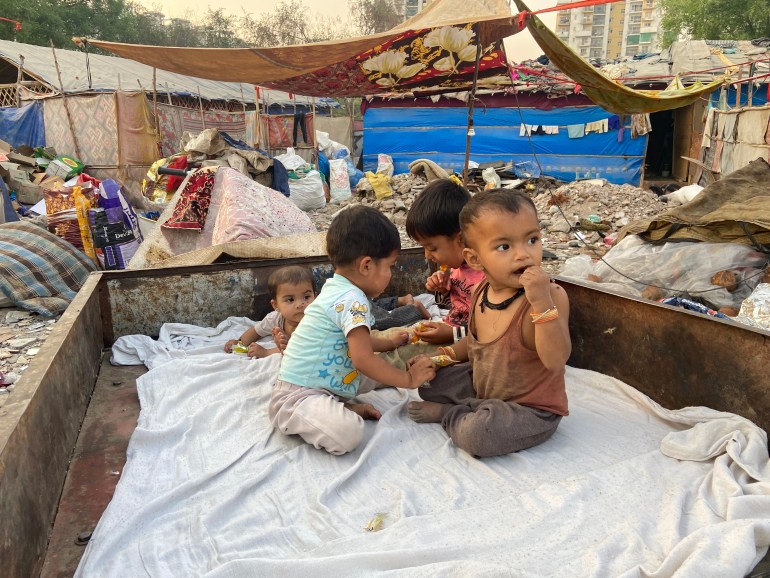Kolkata, India – Muhammad Hamin has been unable to sleep at night since March 8 when the government of the northeast Indian state of Manipur ordered the deportation of Rohingya refugees.
On that day, the state’s Chief Minister N Biren Singh – who belongs to Prime Minister Narendra Modi’s Bharatiya Janata Party (BJP) – posted on X that his government had deported the first batch of eight refugees from a group of 77 members who had “entered India illegally”.
The deportation was later stopped after Myanmar authorities refused to work with India on the matter.
Hamin, a Rohingya who came to India in 2018, is in New Delhi, some 1,700km (1,050 miles) away from Manipur. But the 26-year-old, who is pursuing a bachelor’s degree in business administration in India’s capital, spends his time watching television or scrolling through social media platforms on his mobile phone for any updates on attempts to deport members of his community.
He does this even as he observes the dawn-to-dusk fasts during the holy month of Ramadan.
“The news of deportation has certainly triggered a panic button among most of the Myanmar nationals living in India as nobody knows who would be the next to go out and face the same horror of violence and bloodshed,” he said.
For many Rohingya refugees in India, that fear is tinged with bitter irony. Three days after the Manipur government began its crackdown on Rohingya, Modi’s government on March 11 announced the implementation of a controversial citizenship law aimed at granting Indian citizenship to persecuted minorities from neighbouring countries.
The Citizenship Amendment Act (CAA) grants nationality to six religious minorities – Hindus, Sikhs, Buddhists, Jains, Parsis and Christians – who had come to India from Pakistan, Bangladesh and Afghanistan before 2015 and faced religious persecution.
Missing from the list of potential beneficiaries are Muslim communities from these nations, who are the targets of violence, such as the Ahmadiyya in Pakistan and the Hazara in Afghanistan. Also absent are the Rohingya, from another bordering nation, also persecuted, and also mostly Muslim.
“We are also the victims of religious persecution, just like the citizens of three other countries that will be granted citizenship. We are also a minority in Buddhist-dominated Myanmar. But the Indian government is not bothered about us simply because we are Muslims,” a Rohingya rights activist told Al Jazeera, requesting anonymity for fear of reprisals from the government.
![Myanmar refugees story [Handout via Al Jazeera]](https://www.aljazeera.com/wp-content/uploads/2024/03/IMG_1580_Original-1-1711363217.jpg?resize=770%2C578)
A long struggle
The Rohingya are a mainly Muslim ethnic minority from Myanmar, which denies them citizenship, thereby rendering them stateless and without basic rights. The community, most of whom are residents of Myanmar’s Rakhine State, has been facing violence and repression in the Buddhist-majority country for decades.
In 2017, more than 750,000 Rohingya were forced to flee Myanmar after it launched what the United Nations has called a military campaign conducted with “genocidal intent”. The people fled to the coasts of southern Bangladesh, transforming the region into the world’s largest refugee camp.
Many also fled to neighbouring India or reached the country after fleeing the camps in Bangladesh.
The UN High Commissioner for Refugees (UNHCR) says nearly 79,000 refugees from Myanmar, including Rohingya, live in India, with about 22,000 registered with the UN refugee agency. Most Rohingya in India have been given UNHCR cards that recognise them as a persecuted community.
Hamin arrived in India in 2018 – a year after his family of 11 members landed in Bangladesh’s cramped settlements.
“My family is still in Bangladesh but I came here for my education and started living with my friends who had come here before me,” he said.
But like other Rohingya refugees in India, his existence in the country is precarious.
India is not a signatory to the 1951 UN Refugee Convention, which spells out the rights of refugees and a state’s responsibilities towards them. The South Asian country also does not have a law protecting refugees.
Critics have slammed the government for excluding persecuted minorities such as the Rohingya from Myanmar or the Ahmadis from Pakistan from the scope of the citizenship law, calling it a double standard aimed at pandering to anti-Muslim tropes ahead of the general election starting next month.
‘Reckless statements’
During a hearing last week on a plea challenging the deportation of Rohingya, the government told the Supreme Court the group did not have the fundamental right to live in India.
The Rohingya activist who requested anonymity said: “We have the refugee cards issued by the UNHCR but the Indian government claims we do not have the fundamental right to live in India.”
Supreme Court lawyer Colin Gonsalves condemned the government’s stand.
“The right to live is not only for Indians but covers all citizens in the territory of India, including the Rohingya and others who flee religious persecution. The Indian Constitution protects their rights but it is surprising that senior officers in the government are making reckless statements,” he said.
“The top court makes it clear that protection of the lives of the refugees is a constitutional right. They are protected under [the] non-refoulement or non-return policy that states a refugee cannot be sent back to the place from where he or she had fled due to the fear of physical or sexual assault.”
![Myanmar refugees story [Handout via Al Jazeera]](https://www.aljazeera.com/wp-content/uploads/2024/03/6943fe78-da7d-4738-97de-5761944f4843-1-1711363183.jpg?resize=770%2C514)
‘Future seems dark’
Salai Dokhar is a New Delhi-based activist who runs India for Myanmar, a political campaign creating awareness of the rights of refugees. He fears the deportation of Rohingya could endanger the lives of the refugees amid a civil war in Myanmar that arose after a military coup in the country in 2021.
“We fear the refugees might be used by the [Myanmar] army as human shields in the [civil] war or would be treated badly for leaving the country,” he said, adding that if the Indian government was adamant about deporting the Rohingya, it should hand them over to the National Unity Consultative Council (NUCC), a platform of opposition parties in Myanmar.
For years, the Rohingya in India were also subjected to a hate campaign by alleged right-wing Hindu groups on social media. In January, Hamin and a fellow Rohingya, Muhammad Kawsar, 19, filed a petition in the Delhi High Court demanding action against Facebook for providing a platform for an anti-refugee social media campaign. The petitioners urged the court to order the United States-based social media company to remove hate speech and other harmful content.
“We have been noticing that there are hate campaigns against us on Facebook but the company has done nothing to stop them. Some posts are briefly suspended and soon restored on social media. Such posts heighten the risk of attacks on the vulnerable community by branding them as terrorists,” said Hamin.
Germany-based Rohingya activist Nay San Lwin, also the co-founder of the Free Rohingya Coalition, a non-profit fighting for the rights of the community, said the Indian media’s frequent portrayal of the Rohingya as a potential national security threat has compounded their challenges.
“The right-wing Indian government doesn’t hold a favourable outlook towards us and the situation is only made worse by the apathetic attitude of the media,” he said.
“We just need some protection to live here [until] the situation normalises in our country. But the future seems dark for us.”
Read More: World News | Entertainment News | Celeb News
Aljazera









